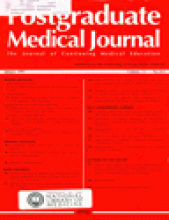-
PDF
- Split View
-
Views
-
Cite
Cite
C Zubaran, J G Fernandes, R Rodnight, Wernicke-Korsakoff syndrome, Postgraduate Medical Journal, Volume 73, Issue 855, January 1997, Pages 27–31, https://doi.org/10.1136/pgmj.73.855.27
Close - Share Icon Share
Summary
Alcohol abuse is one of the most serious problems in public health and the Wernicke-Korsakoff syndrome is one of the gravest consequences of alcoholism. The pathology is often undiagnosed in its less evident presentations, therefore an accurate diagnostic approach is a critical step in treatment planning. Treatment is based on restoration of thiamine, although this is insufficient to prevent the psychological decline of a great number of patients. The cognitive impact of the pathology is derived from the interaction of alcoholic neurotoxicity, thiamine deficiency and personal susceptibility. In this article, the literature concerning Wernicke-Korsakoff syndrome is reviewed.



